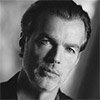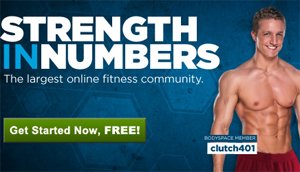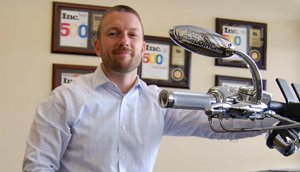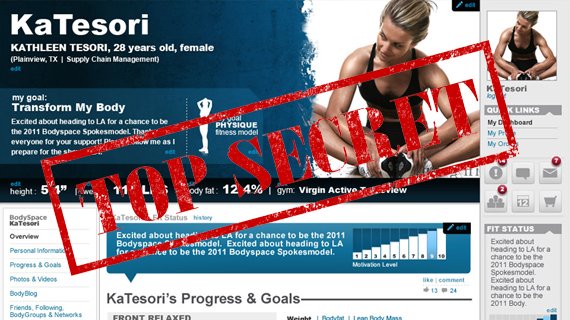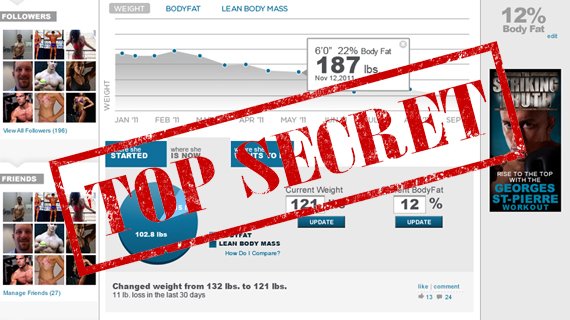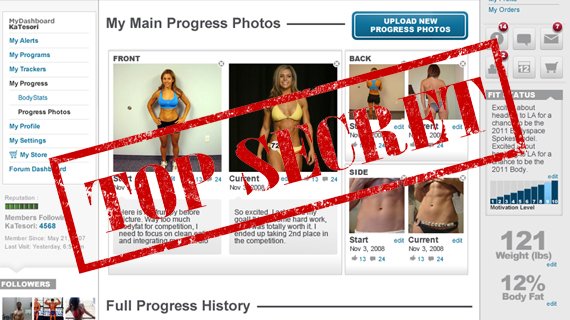BodySpace, the world's largest on-line fitness community, boasts a remarkable growth story.
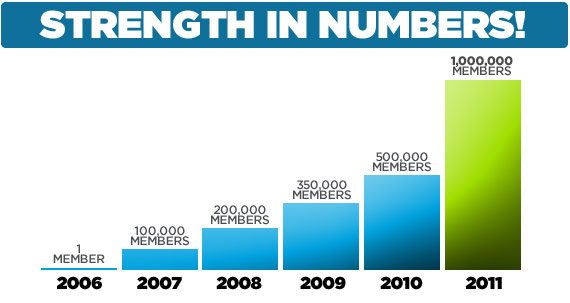
And it all started, literally and figuratively, with one man.
Bodybuilding.com founder and CEO Ryan DeLuca - a.k.a. BodySpace Member No. 1 - looks back at the site's past trajectory and ahead to a (much) bigger and brighter future.
How'd you come up with the idea for BodySpace?
Ryan DeLuca: Back in 1999, when I first became involved with the Internet, it had mailing lists where you would send in a question, and then once a week or so, you'd receive a digest of all the people's questions that were answered, and you'd be able to read through it. I was in high school and had read the muscle magazines for so many years, and this notion of having a dialogue with other people intrigued me. I'd check my email account every day, waiting for it to come through.
So when I started Bodybuilding.com, I was like, "Okay, we have to have a community." We started with message boards, and we saw a lot of growth in that community. Then MySpace.com came along and became a big deal, and of course everybody was talking about, "Who is going to create the MySpace for my industry?" But for a lot of sites, it didn't make sense. You'd see e-commerce sites throw together and bolt on a community. You can just imagine the CEO of Bic Pen or something saying, "We need a community now. Just hook it on and it'll be great." Most of those ideas didn't work.
But the notion proved perfect for fitness, which is a natural community of people that have a passion about what they're doing. It fit perfectly with what people needed to get in shape. It's not just knowing you need to work out, but to have social accountability and a positive social influence on the people around you. I quickly realized this would be a major tool for helping us meet our mission, a competitive tool to help bring people to our site and stay longer.
Strength In Numbers
BodySpace is your key to bodybuilding, transformation, or fitness success. Create your profile, start a BodyBlog, meet others with similar goals, and share information.
Join the largest online fitness communityThe name - did you do sophisticated market research or just think it up, like, driving to work back in those days?
Ryan DeLuca: It's funny to say market research, because we didn't even know what that was, you know? The "research" was what I felt like I needed for myself for working out. And No. 2 was meeting so many customers and staying so customer focused. We thought maybe FitSpace or MuscleSpace - "spaces" were the fad - but neither seemed right. When you said BodySpace, at least back then, a lot of people knew, Oh, that's probably a MySpace for bodybuilding. I wanted something you could understand right away. We'll see if stands the test of time.
So far, so good. Who was the first member?
Ryan DeLuca: I was User ID No. 1. We took our forum membership database and started with that, so if you had a forum account - and everyone had a profile page on the forum - this was like extending the forum to give you more capabilities and tools. So there were really a lot of users on Day 1. They just had to start activating their profiles and uploading pictures and stuff.
Did it ramp up quickly?
Ryan DeLuca: Compared to this industry, and most other niche sites, we had a lot of interest from the beginning. It was immediately recognized as the biggest social network for bodybuilding and fitness. Now it just continues to grow, grow and grow.
Was there an inflection point when you knew this concept would blow up big?
Ryan DeLuca: It was more gradual, and that's really the case for our whole company. There's not any one moment I can think of where I was like, "Man, on this date we did this thing or launched this thing." It's 10,000 changes and 10,000 things we've done over the years.
Any BodySpace transformation stories that stick out the most in your mind?
Ryan DeLuca: Yeah, hundreds. One of the greatest is Tiffany Forni. And Nick Scott, his transformation from the wheelchair and being depressed to today. And Pete Czerwinski. Furious Pete. His story is one you'd almost never believe. He almost died from anorexia, never eating and being so skinny. Now he's a world-class competitive eater who looks like a bodybuilder. You could go back to that time with him in the hospital ... you'd never imagine. So I love it. The thing is, there are hundreds. Every day I go on BodySpace, I see another one. You see some teenager who put on 30 pounds over a short period of time or a post-pregnant mom with three kids who had the mom jeans and now looks amazing.
Are you on BodySpace every day?
Ryan DeLuca: Pretty much, yeah.
Ryan DeLuca's BodySpace
Want to be friends with the founder of Bodybuilding.com? Of course you do! Why wouldn't you?
Befriend Ryan todaySocial media in general strikes a chord, but fitness seems ideally suited for such networking. Why do you think that is?
Ryan DeLuca: People don't have a lot of people to talk to about fitness in their normal networks, outside of online or BodySpace. Most people aren't going to understand why you carry around that jug with purple stuff in it. They're going to think it's weird that you eat chicken breast and broccoli inside a meeting at work. And in a weird way, I honestly believe it's a little bit of jealousy. They're thinking is, if I see someone doing something I'm not doing, it makes me feel bad about myself. I know I should be eating what that person's eating, but I'm eating something not so good. It's easier for me to think that person is vain or focused on idiotic goals rather than to look at myself and realize I'm doing the wrong thing.
The second part pertains to those studies you've probably read, such as if you hang around smokers, you're 300% more likely to be a smoker. Conversely, if your spouse quits smoking, you've got a huge chance that you're going to quit also. Same with obesity - if you hang around with obese people you become obese. And why is that? It's partly because the activities. Most likely obese people aren't going for jogs today or hiking, or they're not eating the right foods, and you notice that.
But it also affects your norms. The thinking goes: I'm only 40% body fat, and these people I hang out with are 60%. So I'm the skinny one. I always use the example of walking into a place you've never been and not knowing what you're supposed to do. Am I supposed to eat with this knife or do these other things? So you look to the person to your left or right to see what they do. So naturally people just do what the crowd does a little bit. If you're hanging around with obese people who are just eating fast food everyday and don't have the right lifestyle choices, you're going to do the same thing.
A major re-design of BodySpace is coming. Tell the community why you're so pumped about it.
Ryan DeLuca: When we started BodySpace, we thought, We've got to get something out there and kind of hack it together, and then we'll "iterate" on it as we go. We continued adding features, but after a while when any site does that, you get this clumsy interface where things don't work quite as well - because it's been years and years of just adding random stuff. Eventually it becomes hard to add new features because things aren't built the right way.
We were missing so many things with this platform, we would never get where we wanted to go with BodySpace. So we created a new platform. The biggest thing with the new platform is a "look-and-feel" update. It'll look more modern and be something you'll want to show off. You want to create a BodySpace profile and feel awesome about it, and now you will.
No. 2 is a big change to navigation. How do you find information? Right now BodySpace is a profile page with just modules of stuff. No rhyme or reason, it feels like. So it gets real cluttered and hard to navigate and elicit feedback. You could have written 10 BodyBlog entries yesterday that could have been super-interesting and I would have no idea. If you're going to spend all this time writing BodyBlog entries and get no feedback, how long is that going to last?
By comparison, the main reason you do anything on Facebook is to get feedback, to get "likes." Same with Twitter and any kind of community - you're creating something or posting something to get feedback, and hopefully it's positive feedback. That's just like real life. Ninety percent of what we do is based on getting the approval of the people around us, from the way we dress to where we work to who we are.
So the interaction in BodySpace is going to be a major new feature. A lot of basic Facebook-type features will be built in, along with a vastly-improved workout tracker, focus on a nutrition tracker, more long-term supplement tracking, vastly-improved charting and progress charts, goal-setting features, and so on.
Another big thing I want users to be able to go to is an inspirational profile, like Kathleen Tesori's, and be like, Holy cow she's got exactly the body that I want right now! So you want to know how she does it. Currently, you could sift through her BodyBlog stuff, and hope maybe she posted a link somewhere. Now, we will make it simple to see her workout, her nutrition plan, her supplements, and follow what she's doing everyday, so you can copy it directly, along with 10,000 other things.
Unrequited friends will no longer be called "stalkers," I've heard? Hopefully it won't lose all the amusing quirks...
Ryan DeLuca: It'll be more Facebook-like when it comes to the interaction. Because that's what people expect. It's like when you're creating a car. Just put the steering wheel in the middle and make it round. Don't mess with it and be creative on that part. Then [in our case] add all of the fitness and bodybuilding features around that.
Look into your crystal ball: When will BodySpace hit 10 million active users?
Ryan DeLuca: I'll be optimistic with my crystal ball, owing to this new platform, because of the interaction and viral features, and how it's going to be much more useful for people ... I would say three years. I think that's a realistic time-frame. I see an acceleration in new members and existing users sticking around longer.
What will BodySpace be like in three years?
Ryan DeLuca: In three years, you'll use BodySpace as your personal trainer for your entire bodybuilding and fitness life. It will be directly with you at all times through an iPhone/Android app or whatever is functional then. In the gym, you'll use it as your workout tracker, nutrition tracker and you'll track the supplements you take.
You'll be able to get personalized recommendations about what you should do next. So the big idea is we'll have ten million people entering data, and some of them are just like you and have similar goals. Kind of like Netflix - if you like this movie, and we all like the same movies, then I'll most likely like this next movie. There will be algorithms in the back end to tell you other people like you changed to this supplement and got better results, or actually worked out one day fewer and got better results, or whatever. It'll be tracking what you're doing, tracking what everyone is doing, and giving you personalized recommendations on how you should change today or next year to achieve the best possible results.
What would you say to the Bodybuilding.com customer who has not yet joined?
Ryan DeLuca: You're missing out on a major tool because the biggest thing that's going to hurt you in bodybuilding and fitness goals is not sticking to it long term! Everybody looks for the secret. What is a secret workout that, if I just knew, I would gain so much muscle mass right away? What's the next supplement that I must be missing out on, and if I just knew it, I would reach all my goals?
The truth is there is no secret, aside from sticking to a program, working out, eating right, taking the right supplements over the long term. Unfortunately, that's the hardest thing. Most people start, go hardcore for a little while, get off it, quit, start again - and that's the most assured way to not reach your goals. BodySpace was designed to help you stick to it over the long term. Science has proved that these tools are what really work. So give it a try!
